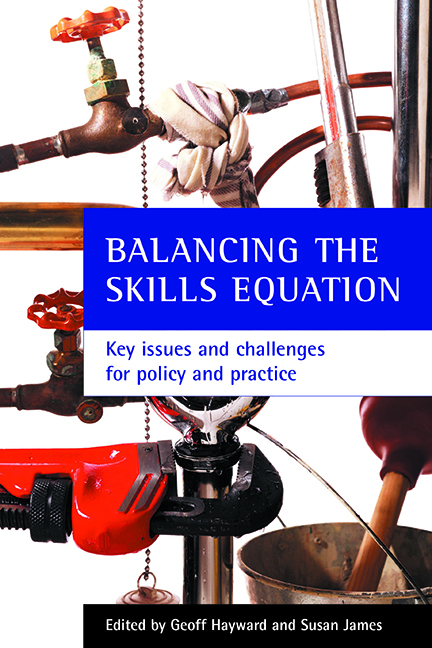Book contents
- Frontmatter
- Contents
- Acknowledgements
- Preface
- Notes on contributors
- one Producing skills: conundrums and possibilities
- two Fit for purpose? Sixty years of VET policy in England
- three The European policy regarding education and training: a critical assessment
- four ‘I can’t believe it’s not skill’: the changing meaning of skill in the UK context and some implications
- five Qualifying for a job: an educational and economic audit of the English 14-19 education and training system
- six Does apprenticeship still have meaning in the UK? The consequences of voluntarism and sectoral change
- seven Tradition and reform: modernising the German dual system of vocational education
- eight Learning in the workplace: reappraisals and reconceptions
- nine Interests, arguments and ideologies: employers’ involvement in education–business partnerships in the US and the UK
- ten Compatible higher education systems and the European labour market: Bologna and beyond
- eleven The expansion of higher education: economic necessity or hyperinflation?
- twelve Becoming a chef: the politics and culture of learning
- Index
- Also available from The Policy Press
three - The European policy regarding education and training: a critical assessment
Published online by Cambridge University Press: 20 January 2022
- Frontmatter
- Contents
- Acknowledgements
- Preface
- Notes on contributors
- one Producing skills: conundrums and possibilities
- two Fit for purpose? Sixty years of VET policy in England
- three The European policy regarding education and training: a critical assessment
- four ‘I can’t believe it’s not skill’: the changing meaning of skill in the UK context and some implications
- five Qualifying for a job: an educational and economic audit of the English 14-19 education and training system
- six Does apprenticeship still have meaning in the UK? The consequences of voluntarism and sectoral change
- seven Tradition and reform: modernising the German dual system of vocational education
- eight Learning in the workplace: reappraisals and reconceptions
- nine Interests, arguments and ideologies: employers’ involvement in education–business partnerships in the US and the UK
- ten Compatible higher education systems and the European labour market: Bologna and beyond
- eleven The expansion of higher education: economic necessity or hyperinflation?
- twelve Becoming a chef: the politics and culture of learning
- Index
- Also available from The Policy Press
Summary
Introduction
The aim of this chapter is to highlight the philosophy governing European policy regarding education and training. It is mainly concerned with a critical assessment of the official discourse as it appeared in the texts produced by the Commission.
Education has become a new field of intervention of the EU following the Maastricht Treaty and the creation of a specific General Division of the EC, DG XXII (now Education and Culture [EAC]). Indeed, it is currently thought that we are facing “an overall transition to a knowledge society, whose economic basis is the creation and exchange of immaterial goods and services” (CEC, 2000c, p 7). In such a world, knowledge and skills are of primary importance in maintaining both individual and national competitive advantage. In other words, education and training become key economic issues.
The legal basis of educational policy is organised by Articles 126 (education) and 127 (training) of the Maastricht Treaty. In Article 126, one finds the statement of an objective: “the Community contributes to the development of an education of quality”, but without any definition of the latter term. Article 126 §2 gives some insights. One means to achieve the objective of quality would be the development of the European dimension in education, inter alia through the teaching of the languages of the member states and favouring the increased mobility of both students and teachers. Such mobility also implies measures ensuring the academic recognition of diplomas all over Europe. Besides mobility, another dimension stated in the Maastricht Treaty is the promotion of cooperation between educational establishments, as well as the development of exchange of information and experiences on issues common to the education systems of the member states. Besides those two elements, the action of the European Community should be directed towards the development of distance education. One should bear in mind that EU actions must take account of the subsidiarity principle. It is indeed explicitly stated in §1 of both Articles 126 and 127 that:
the Community wishes to contribute in the development of quality education by encouraging cooperation between the Member States and, if necessary, by supporting and completing their action while fully respecting the responsibility of the Member States in the contents of education and in the educational systems organisation, just as much as their cultural and linguistic differences.
- Type
- Chapter
- Information
- Balancing the Skills EquationKey Issues and Challenges for Policy and Practice, pp. 35 - 52Publisher: Bristol University PressPrint publication year: 2004

